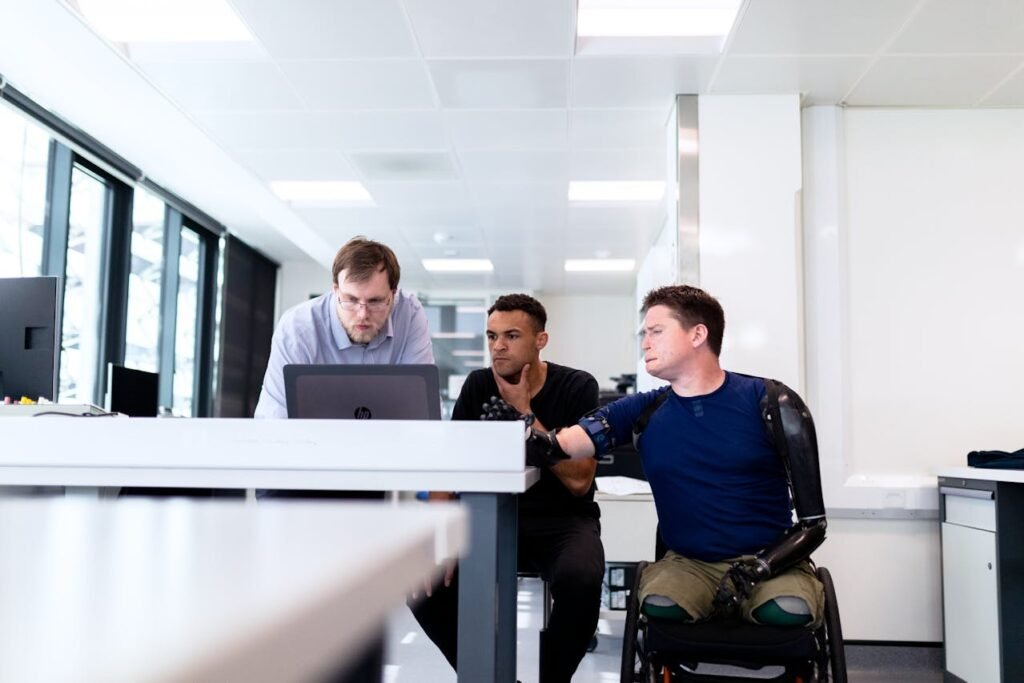Choosing the right prosthetic device is a deeply personal decision. Whether someone is exploring options for the first time or considering an upgrade, the choice between custom and off-the-shelf prosthetics can feel overwhelming. Each type comes with its own set of benefits, challenges, and use cases, making it crucial to understand which option aligns best with individual needs and goals.
Custom prosthetics are tailored to fit the unique anatomy and lifestyle of the user, offering unparalleled personalization and precision. Off-the-shelf prosthetics, on the other hand, are pre-made solutions that cater to common needs and are often more accessible in terms of cost and availability.
At Robobionics, we understand that no two users are alike. In this article, we’ll explore the key differences between custom and off-the-shelf prosthetics, their respective advantages, and how to decide which one is right for you or your patients.
Understanding Custom Prosthetics
Custom prosthetics are meticulously designed to meet the unique requirements of an individual. Every aspect of the device, from its fit and materials to its functionality, is tailored to align with the user’s physical characteristics and lifestyle. This level of customization is especially valuable for those with complex needs, irregular limb shapes, or specific activity goals.
The Process of Customization
Creating a custom prosthetic begins with a detailed evaluation by a prosthetist. This includes assessing the user’s residual limb, mobility goals, and daily activities. Advanced techniques like 3D scanning and molding are often used to create a precise model of the user’s anatomy.
Once the design is finalized, the prosthetic is fabricated using materials that balance strength, weight, and comfort. The final step involves extensive testing and adjustments to ensure the device fits seamlessly and performs optimally.
At Robobionics, our custom prosthetics are crafted with precision and care, ensuring that each device enhances mobility while providing exceptional comfort and confidence.
Advantages of Custom Prosthetics
The biggest advantage of custom prosthetics is their ability to provide a perfect fit. A well-fitted prosthetic reduces pressure points, enhances stability, and minimizes discomfort, allowing users to wear the device for extended periods without strain.
Custom devices also excel in functionality. For instance, an athlete might require a prosthetic designed for high-impact sports, while an office worker might prioritize a lightweight and discreet design. Customization ensures the prosthetic is not just a tool but an extension of the user’s body, tailored to their specific needs.
However, this level of personalization comes at a higher cost and longer production time, making custom prosthetics less accessible for individuals on a tight budget or those who need a device quickly.

The Role of Precision in Customization
At the heart of custom prosthetics is precision. These devices are crafted using advanced technologies, such as 3D scanning and modeling, which ensure a perfect match to the user’s residual limb. This level of accuracy reduces issues like pressure points, skin irritation, or discomfort, which are common in ill-fitting prosthetics.
For individuals with unique anatomical challenges, such as scarring, irregular bone structure, or sensitive skin, the bespoke nature of custom prosthetics provides unparalleled relief and functionality.
For businesses, incorporating cutting-edge tools into the customization process can streamline production and enhance quality.
Technologies like computer-aided design (CAD) and additive manufacturing (3D printing) enable faster prototyping and greater design flexibility, allowing companies to cater to even the most complex cases with confidence.
Functionality Designed for Individual Lifestyles
Custom prosthetics are not just about achieving the right fit—they are also about aligning the device’s functionality with the user’s daily life. An athlete, for instance, may require a prosthetic designed for high-impact sports, complete with energy-return technology and advanced shock absorption.
A professional musician, on the other hand, might prioritize a prosthetic hand that provides precision grip and nuanced finger movements.
This level of lifestyle-specific design is where custom prosthetics truly shine. Businesses can gain a competitive edge by offering specialization, creating devices tailored to specific activities or industries.
Collaborating with users during the design phase ensures that the prosthetic meets their exact requirements, fostering trust and loyalty.
The Emotional Impact of Personalization
Prosthetic devices are deeply personal, and the process of customization often has a profound emotional impact on the user. Custom prosthetics allow individuals to express their identity through aesthetic choices, such as color, texture, or personalized patterns.
For many, this transforms the prosthetic from a medical device into an extension of their personality, boosting confidence and self-esteem.
Businesses that embrace this emotional aspect of customization can differentiate themselves in the market. Offering design consultations or customization packages allows users to feel more involved in the process, creating a sense of ownership and pride in their prosthetic.
Additionally, sharing success stories or testimonials from satisfied customers can highlight the transformative power of personalized prosthetics.
Long-Term Value for Users
While custom prosthetics often come with a higher initial cost, their long-term value is unmatched. These devices are built to last, with materials and components chosen specifically for the user’s needs and environment.
Regular adjustments or upgrades ensure that the prosthetic continues to perform optimally as the user’s circumstances evolve.
For businesses, emphasizing this long-term value can help justify the cost of custom prosthetics to potential customers.
Marketing efforts should highlight the durability, adaptability, and cost-efficiency of custom solutions over time. Providing comprehensive support, such as maintenance plans or follow-up services, further reinforces the investment’s value.
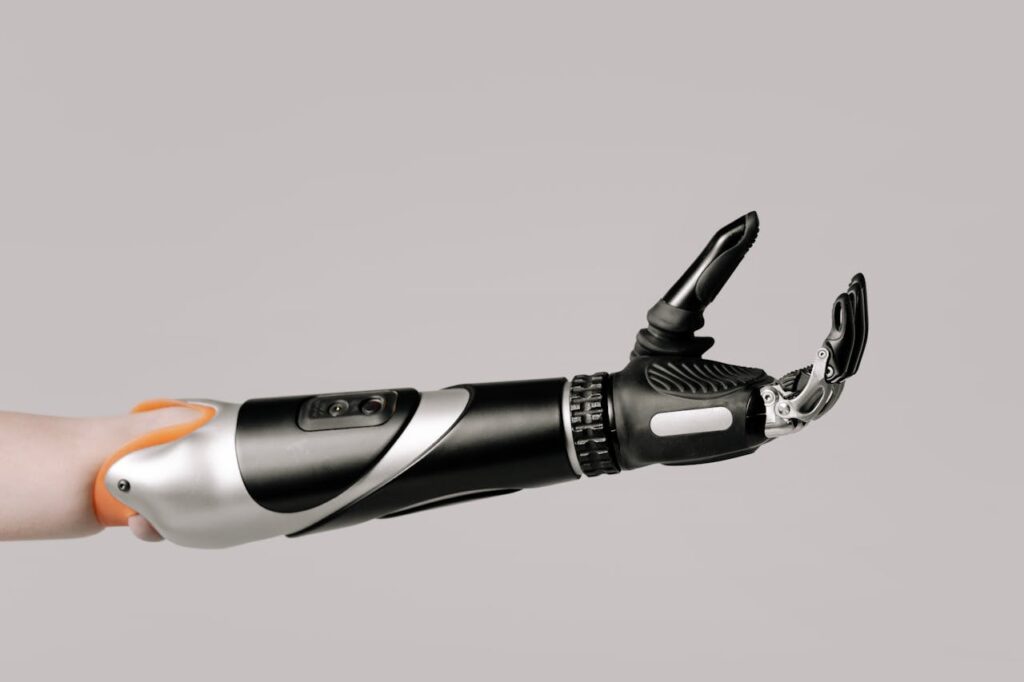
Understanding Off-the-Shelf Prosthetics
Off-the-shelf prosthetics are pre-fabricated devices designed to meet general mobility needs. These devices are manufactured in standard sizes and configurations, allowing users to select a prosthetic that closely matches their requirements without the need for extensive customization.
The Appeal of Accessibility
The primary advantage of off-the-shelf prosthetics is their accessibility. Because they are mass-produced, these devices are often more affordable and readily available. This makes them an attractive option for individuals who need a temporary solution or those with straightforward needs.
Off-the-shelf prosthetics also benefit from streamlined fitting processes. While some adjustments may be required to ensure comfort and usability, these devices can typically be fitted and delivered within a shorter timeframe compared to custom prosthetics.
Robobionics offers a range of high-quality off-the-shelf prosthetics that combine affordability with functionality, ensuring that users receive reliable mobility solutions without unnecessary delays.
Addressing the Needs of First-Time Users
For individuals new to prosthetics, off-the-shelf options can serve as an ideal entry point. These devices are often more cost-effective and readily available, making them accessible to users who are exploring prosthetics for the first time.
The relatively straightforward fitting and adjustment processes reduce the learning curve, allowing users to quickly gain familiarity with their device.
Businesses can capitalize on this by offering education-focused initiatives, such as workshops or instructional materials, that help first-time users understand the features and benefits of off-the-shelf prosthetics.
By providing a supportive onboarding experience, companies can establish trust and encourage long-term engagement with their brand.
A Foundation for Modularity
Modern off-the-shelf prosthetics are increasingly modular, enabling users to enhance or customize their devices over time. This flexibility addresses one of the primary limitations of pre-made solutions—limited adaptability—by allowing users to upgrade components as their needs or circumstances change.
For instance, a basic off-the-shelf limb can be fitted with a more advanced foot or hand, transforming it into a device that rivals custom options in functionality.
For businesses, emphasizing modularity as a feature of their off-the-shelf offerings is a strategic move. This approach appeals to users who may initially choose an affordable prosthetic but wish to explore higher-performance options in the future.
Highlighting the potential for upgrades helps users see off-the-shelf prosthetics as a long-term investment rather than a temporary solution.
Aligning Functionality with Everyday Needs
Off-the-shelf prosthetics excel in addressing common mobility needs, such as walking, standing, and performing basic tasks. These devices are designed to deliver reliable performance in routine scenarios, making them particularly well-suited for individuals with straightforward requirements.
The simplicity of off-the-shelf prosthetics also translates to ease of maintenance, which is a significant advantage for users who prioritize convenience.
Businesses can enhance the appeal of off-the-shelf prosthetics by ensuring that their designs incorporate user-centric features. Lightweight materials, intuitive adjustments, and durable components are all factors that contribute to a positive user experience.
Offering options tailored to specific activities or environments, such as waterproof or shock-absorbing designs, can further differentiate a company’s offerings.
Bridging Accessibility Gaps
One of the most significant strengths of off-the-shelf prosthetics is their ability to bridge accessibility gaps. In regions where healthcare infrastructure or financial resources are limited, these devices offer a lifeline to individuals who might otherwise go without a prosthetic.
By streamlining production and utilizing cost-effective materials, businesses can deliver high-quality solutions at a price point that aligns with the needs of underserved communities.
Companies can extend their reach by partnering with non-profits, government programs, and insurers to distribute off-the-shelf prosthetics in areas with high demand.
Building relationships with local healthcare providers also ensures that users receive the necessary guidance and support to make the most of their device.
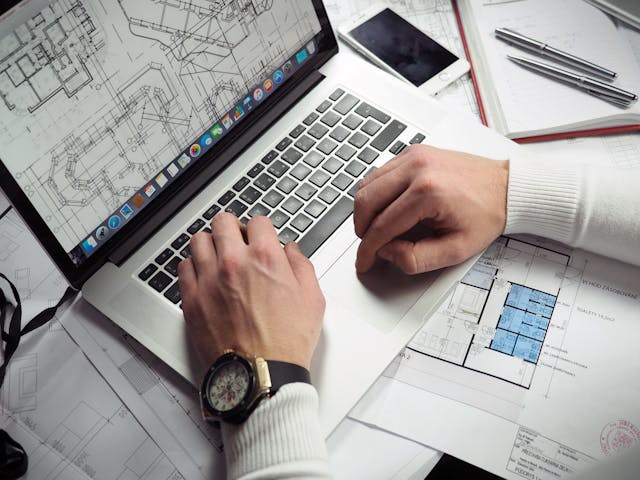
Supporting Scalability for Businesses
From a business perspective, off-the-shelf prosthetics offer scalability that is difficult to achieve with fully custom solutions. Standardized manufacturing processes enable companies to produce these devices in larger volumes, reducing costs and improving efficiency.
This scalability not only supports profitability but also allows businesses to expand their offerings to a global market.
To maximize the potential of off-the-shelf prosthetics, businesses should focus on streamlining supply chains and investing in quality assurance.
Developing user-friendly sizing systems and clear fitting guidelines ensures that these devices meet diverse needs without compromising on performance.
Additionally, offering robust customer support, including virtual consultations and troubleshooting resources, enhances the overall user experience.
Comparing Custom and Off-the-Shelf Prosthetics
When deciding between custom and off-the-shelf prosthetics, understanding how they compare in terms of fit, functionality, cost, and long-term usability is crucial. Each option caters to different priorities and user scenarios, making the choice deeply personal and context-specific.
Fit and Comfort
Custom prosthetics are unmatched when it comes to achieving a precise fit. Tailored to the exact contours and dimensions of the user’s residual limb, they reduce pressure points and prevent issues like skin irritation or discomfort.
For individuals with irregular limb shapes or sensitive skin, the personalized nature of custom prosthetics is often indispensable.
Off-the-shelf prosthetics, while adjustable, rely on standard sizing and configurations. While this approach works well for many users, it may not provide the same level of comfort for those with unique anatomical needs.
Small adjustments made by a prosthetist can improve the fit, but they may not achieve the seamless integration that custom solutions offer.
Functionality and Performance
The functionality of a prosthetic device largely depends on its alignment with the user’s activities and goals. Custom prosthetics shine in this area, as they can be designed with specialized features for specific tasks.
For example, a custom lower-limb prosthetic for a runner might include energy-return technology, while a hand prosthetic for an artist might prioritize precision grip and dexterity.
Off-the-shelf prosthetics, though versatile, are generally geared toward general mobility needs. They are ideal for users with straightforward requirements, such as walking or basic tasks, but may lack the advanced capabilities needed for highly active lifestyles or specialized applications.
Robobionics bridges this gap by offering modular off-the-shelf prosthetics that allow users to upgrade components as their needs evolve, combining the affordability of pre-made solutions with the adaptability of custom options.
Cost Considerations
Cost is often a decisive factor when choosing between custom and off-the-shelf prosthetics. Custom prosthetics, with their bespoke designs and specialized materials, typically come with a higher price tag.
However, they offer long-term value by minimizing the need for frequent adjustments or replacements, particularly for users with unique requirements.
Off-the-shelf prosthetics are more budget-friendly upfront, making them accessible to a wider audience. For individuals seeking a temporary solution or those exploring prosthetics for the first time, they can be an excellent starting point.
Businesses can enhance accessibility by offering financing options or partnerships with insurance providers to reduce out-of-pocket expenses for users.
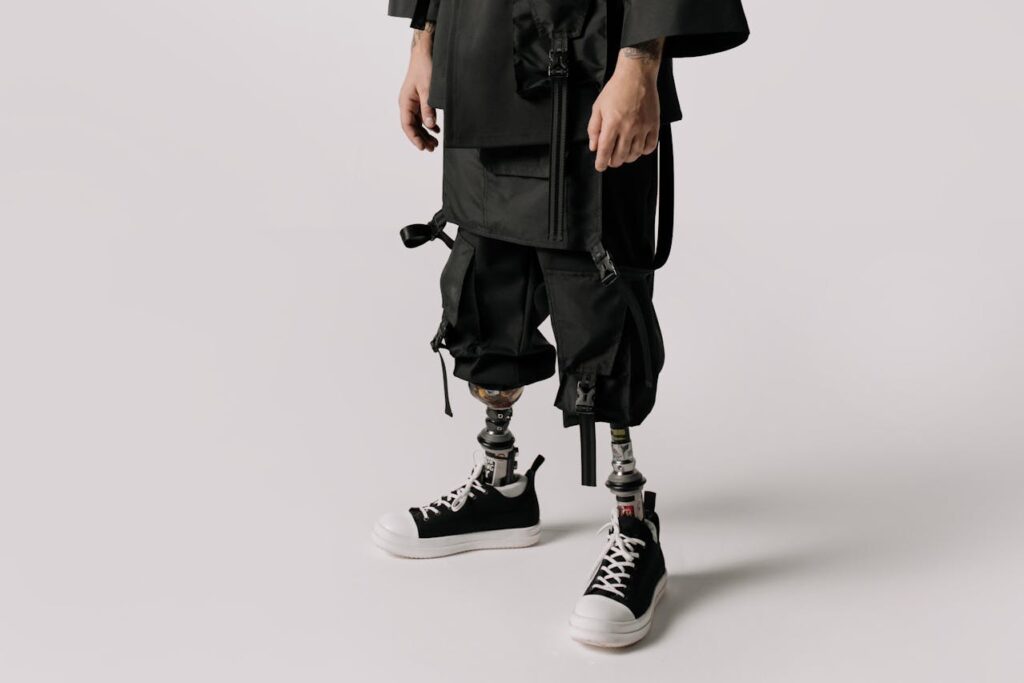
Adaptability and Maintenance
Custom prosthetics are often designed with long-term adaptability in mind. As the user’s needs change—due to factors like weight fluctuations, increased activity levels, or new hobbies—the prosthetic can be adjusted or modified to maintain optimal performance. This makes custom solutions a worthwhile investment for individuals seeking stability and continuity over time.
Off-the-shelf prosthetics, while reliable, may require more frequent replacements or upgrades to accommodate significant changes in the user’s condition or lifestyle.
For businesses, offering maintenance packages and easy access to replacement parts can enhance the usability and lifespan of these devices, ensuring customer satisfaction.
Tailored Fit vs. Standard Convenience
The defining feature of custom prosthetics is their ability to provide a tailored fit. Each device is meticulously crafted to match the user’s anatomy, ensuring optimal comfort and functionality.
This precise fit reduces common issues such as chafing, skin irritation, and poor weight distribution, making custom solutions ideal for users with unique physical challenges.
In contrast, off-the-shelf prosthetics prioritize convenience and accessibility. These devices are designed with standard configurations that can be quickly adjusted to suit most users.
While they may not achieve the same level of precision as custom prosthetics, their simplicity and quick availability make them an attractive choice for individuals who need an immediate solution or have straightforward mobility needs.
Performance in Specialized Activities
When it comes to specialized activities, custom prosthetics often outshine their off-the-shelf counterparts.
Designed to accommodate specific demands, custom devices can incorporate advanced features like dynamic ankle joints for running, energy-return feet for high-impact sports, or precision grips for intricate tasks.
This makes them the go-to choice for athletes, professionals, and individuals with active lifestyles.
Off-the-shelf prosthetics, while versatile, are typically optimized for general mobility tasks such as walking and standing. They may lack the adaptability required for specialized activities but can still serve as reliable tools for users with less demanding requirements.
Accessibility and Affordability
Affordability is a significant factor influencing the decision between custom and off-the-shelf prosthetics. Custom solutions often come with a higher upfront cost due to their personalized design and use of advanced materials. However, they offer long-term value by reducing the need for frequent replacements or adjustments.
Off-the-shelf prosthetics are more budget-friendly, making them a popular choice for individuals with limited financial resources or those seeking temporary solutions.
Their standardized production process reduces manufacturing costs, allowing businesses to offer them at competitive price points.
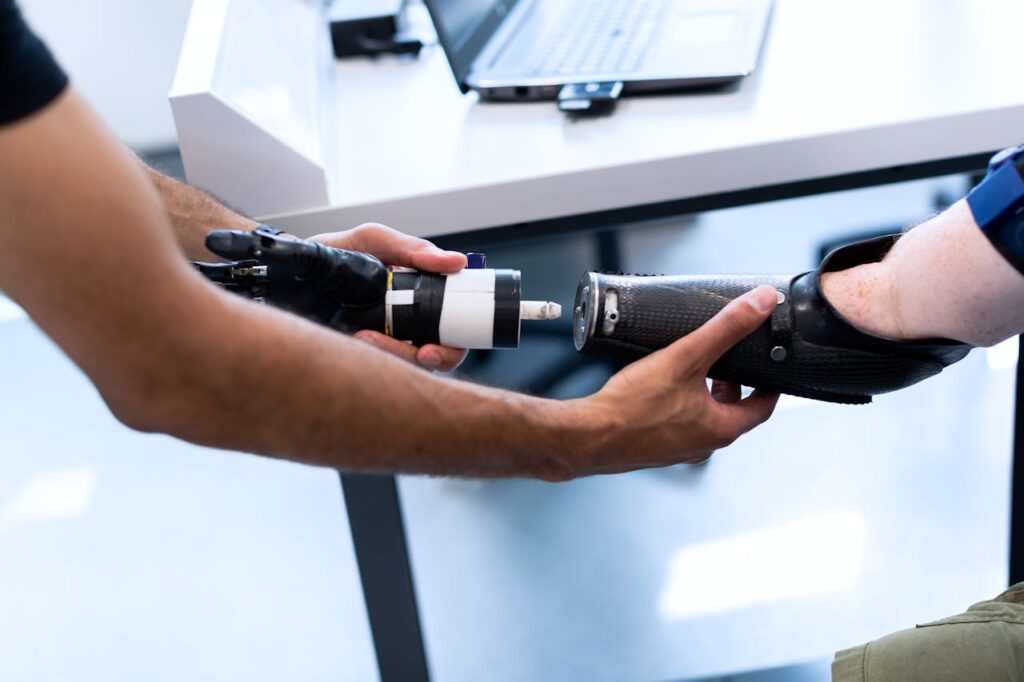
Making the Decision: Custom vs. Off-the-Shelf
Choosing between custom and off-the-shelf prosthetics requires a comprehensive evaluation of the user’s unique circumstances, priorities, and expectations. For businesses, guiding users through this decision involves understanding their needs and providing tailored recommendations that align with their goals.
Evaluating Individual Needs
The starting point in making the decision is an in-depth assessment of the user’s physical and lifestyle requirements.
For users with complex needs—such as irregular limb shapes, high activity levels, or specific professional demands—a custom prosthetic is often the optimal choice. Its tailored fit and functionality ensure that it meets both immediate and long-term goals.
Conversely, off-the-shelf prosthetics may be more suitable for individuals with general mobility needs, straightforward limb profiles, or budget constraints. These devices offer a practical and cost-effective solution for users seeking reliability and ease of use without extensive customization.
For businesses, investing in tools like gait analysis, strength evaluations, and lifestyle assessments can help identify which type of prosthetic will best serve the user. Offering free consultations or online assessment tools further enhances the decision-making process.
Addressing Budget Constraints
Affordability is a key consideration for many users, and businesses must be prepared to offer solutions that cater to a range of financial situations.
For those leaning toward custom prosthetics but facing budgetary limitations, flexible payment plans or insurance assistance can make these advanced devices more attainable.
Off-the-shelf prosthetics, with their lower upfront cost, can serve as an excellent entry point for users exploring their options.
Businesses can highlight the possibility of upgrading or transitioning to a custom prosthetic later, ensuring users feel empowered to make a decision that balances their financial and functional needs.
Exploring Hybrid Solutions
The lines between custom and off-the-shelf prosthetics are becoming increasingly blurred, thanks to advancements in modular design and adaptive technology. Many off-the-shelf prosthetics now offer customizable components, allowing users to tailor the device to their unique preferences over time.
For example, a pre-made prosthetic limb can be fitted with advanced feet or hands that enhance functionality, or it can include adjustable sockets that improve comfort.
These hybrid solutions combine the accessibility of off-the-shelf devices with the personalization of custom prosthetics, offering a middle ground that appeals to a wide range of users.
At Robobionics, we have embraced this approach by offering modular designs that grow with the user, ensuring their prosthetic remains relevant as their needs evolve.
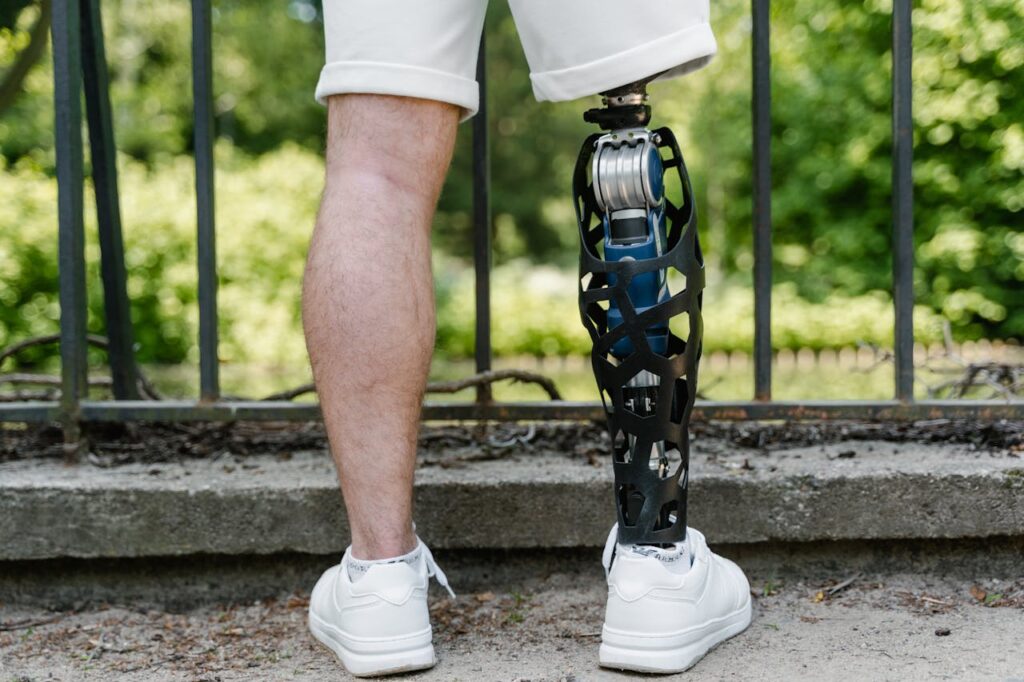
Providing Comprehensive Support
Regardless of whether a user chooses a custom or off-the-shelf prosthetic, the level of support they receive plays a critical role in their satisfaction and success.
Businesses must prioritize post-purchase services, such as regular fittings, maintenance, and rehabilitation programs, to ensure the device continues to meet the user’s needs.
Custom prosthetic users may require ongoing adjustments as their residual limb changes, while off-the-shelf users may benefit from periodic upgrades or replacements. By offering accessible and proactive support, businesses can build trust and long-term relationships with their customers.
Conclusion
The choice between custom and off-the-shelf prosthetics is deeply personal and depends on a variety of factors, including physical needs, lifestyle goals, and financial considerations.
Custom prosthetics offer unparalleled precision and personalization, making them ideal for users with complex requirements or specific aspirations. Off-the-shelf prosthetics, on the other hand, provide a practical, accessible solution for those seeking reliability and affordability.
For businesses, supporting users in this decision means offering not just options, but guidance. Clear communication about the benefits and limitations of each type of prosthetic, coupled with tailored consultations and ongoing support, ensures that users feel empowered to choose the solution that’s right for them.
At Robobionics, we pride ourselves on delivering both custom and off-the-shelf prosthetic solutions that enhance mobility, confidence, and independence. By combining advanced technology with compassionate care, we strive to make prosthetic solutions accessible and effective for everyone.



